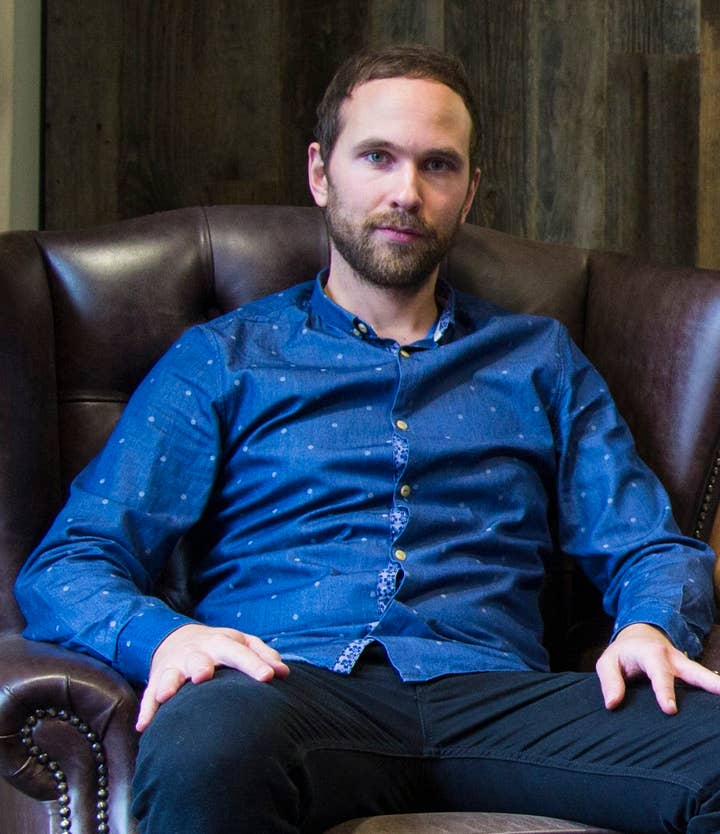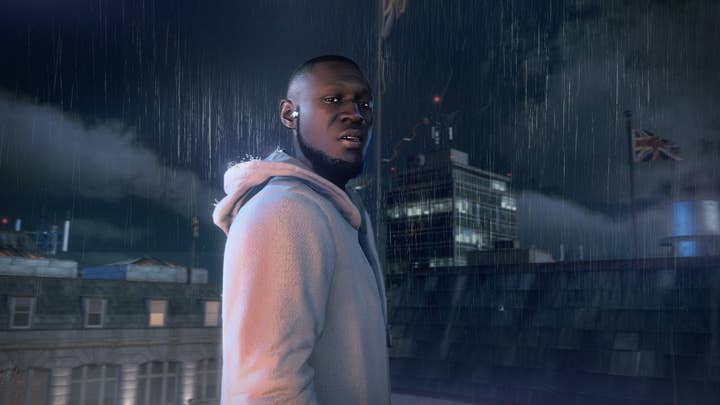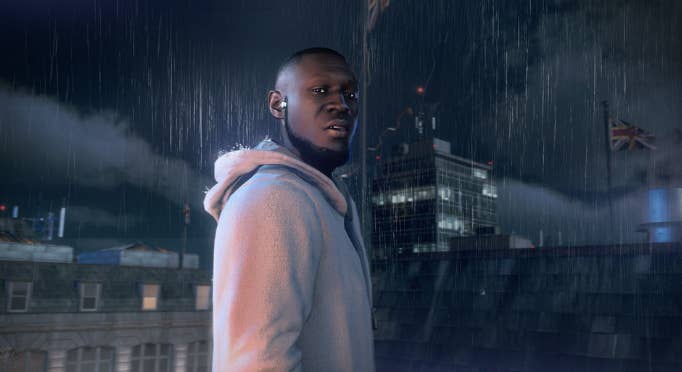Warner Music: "If artists want to be in the next James Bond, they should want to be in the next AAA game"
The record label on the changing relationship between games and music
The coming together of video games and music isn't anything new.
From the early days of licensed music in FIFA, to the glory days of SingStar and Guitar Hero, the two industries have collaborated in numerous, hugely lucrative ways. There have been entire games built around individual artists, whether that's Wu-Tang Clan, Iron Maiden or Take That. There's even a series of Def Jam wrestling games.
Yet in recent years the two industries have united in altogether different ways that go beyond a bit of licensing. The big headlines have been around the likes of Marshmello and Travis Scott performing in Fortnite, attracting 23 million viewers between them. And last month British rapper Stormzy appeared in Ubisoft's Watch Dogs: Legion, with the game forming the basis of his latest music video.
"[These collaborations] are so powerful," explains Tim Miles, vice president of synchronisation at Warner Music UK. "We've seen it before in TV and movies. Out of nowhere you can have this moment where your streams have doubled, and you've got all these new fans. [Stormzy in Watch Dogs] is probably the first time in a gaming sense where we've seen a similar impact as the Bond movie had on Billie Eilish. It's the same impact, if not greater."
"When signing a new artist, we now ask what games do you play and what consoles do you like?"
Tim Miles, Warner Music
Warner Music has worked proactively in getting music featured in film, TV and advertising for decades, but it was only four years ago that it really started to push into games.
"It was probably a bit too late even four years ago," Miles continues. "There was a real attitude shift. Historically, gaming was all about FIFA and Grand Theft Auto and SingStar and Guitar Hero... that was the extent of it. Then four years ago we said that this was just not good enough. We have a duty to our artists. If they want to be in the next James Bond film, they should also want to be in the next big AAA title.
"So we went to E3 and did that whole handshake thing. We learnt quite quickly that gaming companies don't really trust the music business, so we set out on a journey to change that. The big turning point was Rob [Vicars, creative sync coordinator for Games & New Media] joining the team. We needed to bring someone in who talks the language."
Vicars remembers: "I came in sort-of blinkered. I'd done little bits in the games space, but mostly as a passion. Similarly, I had also played in bands that had been signed to a few labels. So I had this network of contacts across both areas.

"You would have thought that there would be all these connections pre-made ready to go, but there was a surprisingly small amount of that. It was really a case of going out and speaking to publishers, developers, esports companies and all the other niches, both from their point-of-view and from a music and technical perspective."
It wasn't just going out to the games industry. The early years were also about educating the rest of Warner Music, and finding out which of their artists actually played video games.
"Bearing in mind we have maybe 500 active artists, we didn't have a clue who cares about this stuff," Miles says. "When you sit in a room with a developer, that's the first question: who plays games? So we built up that roster. Games are now part of the signing conversation. We ask what kind of trainers do you wear? That's one question. And now we ask what games do you play and what consoles do you like?
"A great example of that is we signed an artist called Hyyts. We found out that they are into Call of Duty, so we immediately reached out to the Call of Duty League. It's very much about creativity and authenticity first -- that's what led us to some bigger projects."
"[The Fortnite shows] are events. They come and go. The Stormzy thing... it's something people will play for the rest of time"
Tim Miles, Warner Music
And you don't get much bigger than Stormzy having a role in the latest major Ubisoft release.
"I always love stressing that this didn't fall into our laps," Miles says. "This wasn't Ubisoft saying that they desperately wanted Stormzy. This was us sitting in a room with Ubisoft three years ago, two years ago, one year ago... talking about shared values and ideas. They told us about Watch Dogs and where it was set and what it stands for. We then spoke about our aims and the artists we are signing, and Stormzy came up.
"Then obviously you have to go and translate that to the artist and say 'there's this game, do you want to do it? It's two years away and your music is out next year.' Getting the two to fit together is difficult. But we had two very easy to deal with partners in Stormzy and Ubisoft."
Vicars continues: "With Ubisoft, our initial pitch was driving on this authenticity. There are a number of slightly frustrating examples of the music industry coming into the games space in a way that isn't authentic. That's frustrating, because there are many opportunities to be super authentic. They're both creative spaces and there's no reason why they can't fit together more naturally. We wanted something real. It feels like the game was written for him, really."

Miles again: "Ubisoft is like a huge tanker ship and so are we, and trying to get the two ships on the same course at the same time... that would have been near impossible ten years ago. What we're managing to do now is merge these worlds. It is difficult. You have to look for the thing that's powerful for both sides.
"Also, the timeline of a game versus the timeline of the music business... they couldn't be more different. We do things quickly. It's part of our culture. In the games industry, we had a call with a developer about a game for release in three years time. They were asking if we have an artist that could be the protagonist... We were like 'okay, who is going to be signed to us in three years?' We have to find new ways of working. Stormzy has shown that it can be done."
Ubisoft itself is no stranger to working with artists. It has featured DJs and musicians in its games before, and also has the Just Dance series. Yet this partnership wasn't a transactional music agreement.
"We want collaborations on all different levels, it's not just about the big hits"
Rob Vicars, Warner Music
"It became very clear early on that everyone was equally enthusiastic about the idea, making a potentially difficult and complex partnership to navigate a success," says Ubisoft's UK marketing head Mark Slaughter. "On reflection, there were a few factors in this; yes the stars aligned where we had a game set in London in which the themes of the title spoke to the sensibilities of an artist who is both credible and authentic. But what really helped was that Warner and Stormzy's team were engaged from the beginning."
Miles adds: "Stormzy was blown away, spending five days with the I, Robot creative director... It was the first time we recorded a music video like this and he was being rendered on the screens around him. But at that point, his appearance was going to be via DLC, and on our side, we were still talking about it just within our team. Then it started to go wider -- they wanted it to be in the main game, and we managed to engage our radio folks, the streaming teams, and our marketers.
"The week the game came out, there were various visuals on Spotify. Normally Ubisoft wouldn't have access to a space like that. That song is now on the Radio 1 playlist, and every time they play that song they can reference the game. Ubisoft got good value out of it, and in return, the amount of games press talking about Stormzy... It really benefited both sides.

"On the day the Stormzy news dropped, my mum in her 60s texted me because it was on the six o'clock news," Miles says. "My nephew saw it on YouTube,and asked if I was part of that. I was in the pub before lockdown, and my friends were asking me about it. It translated across entire differing groups."
It hasn't all been about Stormzy. Another recent partnership has seen metal band Korn appear in World of Tanks Blitz, and characters from that game appear in the latest Korn music video.
"The music video had to be filmed throughout COVID," Miles says. "The deal was signed in August. It was a bit late in the day to achieve what we did, but in terms of the streams on our side, they are up 1000% on that song."
Another recent collaboration saw Gorillaz feature Pac-Man and Grand Theft Auto in its latest music videos.
"Obviously they're virtual artists and unique in that sense," Miles says. "We basically hooked them up with Pac-Man and they used that IP, and now we're doing the same with Grand Theft Auto. We can now make these connections. Ten years ago, if Gorillaz said they wanted to do something with Pac-Man, we'd be cold calling people for six months."
For Warner Music, the opportunities in games are numerous, and the recent Fortnite events with Marshmello and Travis Scott show how much impact these tie-ups can have.
"We would love to see virtual events form part of an artist's calendar, and it's not just about Glastonbury and a Radio 1 show"
Tim Miles, Warner Music
"Seeing persistent worlds become more popular in games has been a big thing for music," Vicars says. "Fortnite is social in a way that people in the music industry, who don't necessarily connect to games on a core level, can understand. They can see the value there."
Miles adds: "The Fortnite thing is brilliant, and we are trying to build this roadmap of what virtual spaces look like to artists. This game is like a Glastonbury, this game is like a Barfly... We need to translate the different worlds, but they're events. They come and go. The Stormzy thing... it's something people will play for the rest of time. With Marshmallo in Fortnite, I would potentially say that is a music event as much as it is a games event. Stormzy in Watch Dogs is a games event that leans into our culture. That's what we want to do more of. "
However, it's not all about AAA games and chart-topping artists.
"We want collaborations on all different levels -- it's not just about the big hits" Vicars says. "We did another thing with a developer called Radical Forge on the game Bright Paw. We hooked them up with one of our artists called Fades, and they all got together in our studios in Kensington... What they wanted, and the artist wanted, was something that would tie closely with the game and it be a collaborative effort. That is a completely different scale to Stormzy and Watch Dogs, but it is still this amazing thing. There could just be more of that on a day-to-day basis."
Miles and Vicars have become key in building these partnerships. Although the likes of EA are well versed in working with record companies, the rest of the games industry isn't so formalised. And that's actually helped lead to these more experimental concepts.
"What is exciting to us are the companies who perhaps don't have that gatekeeper," Miles says. "If they do have a music department, it can become quite transactional. We like to have a conversation with the developer. With Ubisoft, we spoke to the music department eventually, but they were the last team we dealt with."
He concludes: "What we want to see more of is this creative, culturally-resonating content that can bring these industries closer. Whether it's a live event and we can find the right talent for that... or a new mobile game and we have a great artist who can make a super cool soundtrack... Or whether it's talking to a AAA developer about title that's coming out in three years. What we want to see is more of these conversations. There is so much untapped potential.
"We have this case study on how to work with the music industry. We would love to see virtual events form part of an artist's calendar, and it's not just about Glastonbury and a Radio 1 show. We simply want more of these big moments that get people excited."

